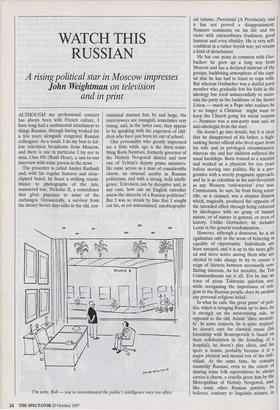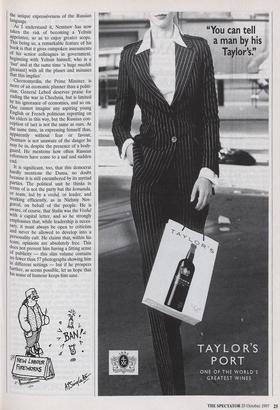WATCH THIS RUSSIAN
A rising political star in Moscow impresses
John Weightman on television
and in print
ALTHOUGH my professional concern has always been with French culture, I have long had a sentimental attachment to things Russian, through having worked for a few years alongside congenial Russian colleagues. As a result, I do my best to fol- low television broadcasts from Moscow, and there is one in particular I try not to miss, Chas Pik (Rush Hour), a one-to-one interview with some person in the news.
The presenter is called Andrei Razbash and, with his regular features and close- clipped beard, he bears a striking resem- blance to photographs of the late, massacred tsar, Nicholas II, a coincidence that gives piquancy to some of the exchanges. Occasionally, a survivor from the dreary Soviet days talks in the old, con- ventional manner but, by and large, the interviewees are youngish, sometimes very young, and, in the latter case, they appear to be speaking with the eagerness of chil- dren who have just been let out of school.
One personality who greatly impressed me a little while ago is the thirty-some- thing Boris Nemtsov, formerly governor of the Nizhniy Novgorod district and now one of Yeltsin's deputy prime ministers. He came across as a man of considerable charm, an unusual quality in Russian politicians, and with a strong, bold intelli- gence. Television can be deceptive and, in any case, how can an English onlooker assess the sincerity of a Russian politician? But I was so struck by him that I sought out his, as yet untranslated, autobiographi- 'I'm sony, Bob — you've overestimated the public's intelligence once too often.' cal volume, Provintsial (A Provincial), and it has not proved a disappointment. Nemtsov comments on his life and his views with extraordinary frankness, good humour and even ribaldry. He is very self- confident in a rather boyish way, yet retains a kind of detachment.
He has one point in common with Gor- bachev: he grew up a long way from Moscow and has a declared mistrust of the gossipy, backbiting atmosphere of the capi- tal that he has had to learn to cope with. But whereas Gorbachev was a dutiful party member who gradually lost his faith in the ideology but tried unsuccessfully to main- tain the party as the backbone of the Soviet Union — much as a Pope who realises he is no longer a Christian might want to keep the Church going for social reasons — Nemtsov was a non-party man and an anti-ideologist from the start.
He doesn't go into details, but it is clear that he disapproved of his father, a high- ranking Soviet official who lived apart from his wife and in privileged circumstances, whereas she and her children suffered the usual hardships. Boris trained as a scientist and worked as a physicist for ten years before moving into politics. He is a pro- gressive with a strictly pragmatic approach, and he is as relentless in his anti-Sovietism as any Western 'cold-warrior' ever was. Communism, he says, far from being scien- tific, as it claimed, was a utopian illusion which, tragically, produced the opposite of the intended effect through being enforced by ideologues with no grasp of human nature, or of nature in general, or even of history. Unlike Gorbachev, he includes Lenin in the general condemnation.
However, although a democrat, he is an egalitarian only in the sense of believing in equality of opportunity. Individuals are born unequal, and it is up to the more gift- ed and more active among them who are elected to take charge to try to ensure a reign of fairness between necessarily con- flicting interests. As for morality, the Ten Commandments say it all. Yet he has no trace of pious Tolstoyan quietism nor, while recognising the importance of reli- gion to the Russian people, does he profess any personal religious belief. In what he calls 'the great game' of poli- tics, which is bringing Russia up to date, he is strongly on the westernising side, as opposed to the old, Asiatic 'slave mentali- ty'. In some respects, he is quite atypical: he doesn't care for classical music (his friendship with Rostropovich is based on their collaboration in the founding of a hospital), he doesn't play chess, and his sport is tennis, probably because it is major physical and mental test of the indi- vidual. At the same time, he remains staunchly Russian, even to the extent of sharing some folk superstitions: he always carries a charm, a crucifix given him by the Metropolitan of Nizhniy Novgorod, and, like some other Russian patriots, he believes, contrary to linguistic science, In the unique expressiveness of the Russian language.
As I understand it, Nemtsov has now taken the risk of becoming a Yeltsin appointee, so as to enjoy greater scope. This being so, a remarkable feature of his book is that it gives outspoken assessments of his senior colleagues in government, beginning with Yeltsin himself, who is a `tsar' and at the same time 'a huge muzhik [peasant] with all the pluses and minuses that this implies'. Chemomyrdin, the Prime Minister, is more of an economic planner than a politi- cian, General Lebed deserves praise for ending the war in Chechnia, but is limited by his ignorance of economics, and so on. One cannot imagine any aspiring young English or French politician reporting on his elders in this way, but the Russian con- ception of tact is not the same as ours. At the same time, in expressing himself thus, apparently without fear or favour, Nemtsov is not unaware of the danger he may be in, despite the presence of a body- guard. He mentions how often Russian reformers have come to a sad and sudden end.
It is significant, too, that this democrat hardly mentions the Duma, no doubt because it is still encumbered by its myriad Parties. The political unit he thinks in terms of is not the party but the komanda, or team, led by a vozhd, or leader, and Working efficiently, as in Nizhniy Nov- gorod, on behalf of the people. He is aware, of course, that Stalin was the Vozhd with a capital letter, and so he strongly emphasises that, while leadership is neces- sary, it must always be open to criticism and never be allowed to develop into a Personality cult. He claims that, within his team, opinions are absolutely free. This does not prevent him having a fitting sense of publicity — this slim volume contains no fewer than 57 photographs showing him in different settings — but if he prospers further, as seems possible, let us hope that his sense of humour keeps him sane.



















































































 Previous page
Previous page